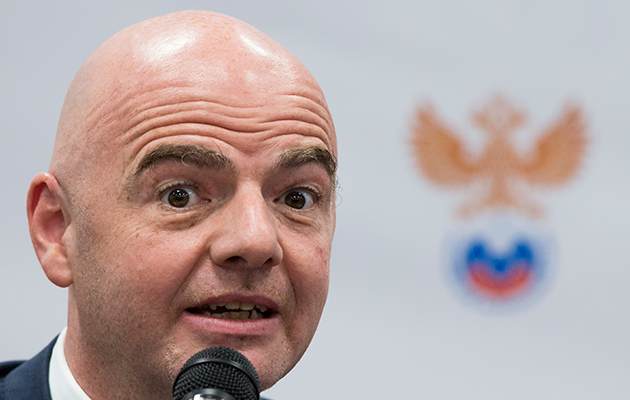Confirmation of the pay deal for FIFA president Gianni Infantino has clarified one point at least: onhe of the points he found “insulting” back in May was not so much the sum proposed as the person proposing it.
A selectively-issued statement from FIFA has announced that the man who succeeded banned and disgraced Sepp Blatter in February will receive SFr 1.5m-a-year (£1.15m / $1.52m) with a car, accommodation and monthly expense limit of SFr 2,000 (£1,542 / $2,025).
These are the sort of sums for which no self-respecting, world economy-crashing banker would cross the road.
Similarly, new secretary-general Fatma Samoura is being paid SFr 1.3m-a-year (£1m / $1.32m) with a car (but not, apparently, accommodation) plus the same expenses limit.
Neither Samoura nor Infantino will receive a bonus in the current year but the terms for additional emoluments for the future are under review.
This flies in the face of the original contract offer which killed off presidential bonuses altogether – and thus suggests that Infantino has an open bonus door for the latter three years of his presidential reign.
The latest agreement follows the pay proposals from a reconstituted compensation sub-committee headed by Slovenia’s Tomaz Vesel and also comprising finance committee chairman Issa Hayatou and a new appointee in German independent expert Peter Braun.
A FIFA statement said: “The compensation sub-committee, chaired by Tomaz Vesel, has determined these figures by taking into account a number of factors, including two independent expert opinions prepared by external human resources consultants.”
Their status basic is below the sum which Infantino was heard describing as “insulting” in the selectively-edited recording of the executive committee meetings which immediately preceded the Mexico City Congress in May.
Infantino had then turned down an offer of SFr 2m (£1.4m / $2m) from a compensation panel which was headed by Domenico Scala, the Swiss businessman who, at the time, was also chairman of the audit and compliance committee.
This was around one-third of the basic SFr 3.7m salary which had been paid to Blatter; the latter also benefited significantly from generous bonuses.
In the case of accommodation the original offer set a SFr240,000 limit but the new offer is unlimited, leaving Infantino free to rent whatever high-value property he fancies.
On the thorny bonus issue, FIFA added: “The compensation sub-committee decided that bonuses would not be awarded for 2016 because the members, the president and the secretary-general believe that FIFA’s current compensation policy is inadequate and open to malfunction and misuse.
“Bonus payments from 2017 onwards will be awarded in accordance with objective criteria related to FIFA’s mission and operations as well as the outcome of the organisational reforms that are currently being implemented.”
Vesel and his colleagues are also planning “a comprehensive review of FIFA’s compensation policy” doubtless in view of the self-serving internal system effected under Blatter and through which enormous and unjustifiably excessive pay and bonus awards were gifted to the then secretary-general Jerome Valcke and finance director Markus Kattner (both sacked earlier this year).
As Vesel said, in an under-statement: “Historic shortcomings demonstrate that the present policy is inadequate.” He added, in a note which suggests possible legal action ahead, that “as part of this review, we are carefully examining all payments made to previous FIFA management.”
Quite why the president of FIFA should enjoy the right to a bonus at all remains as baffling now as when Scala’s committee scrapped the option.
Infantino escaped only last month from an ethics committee review of issues concerning expenses and flights which could have been avoided if he had signed his formal contract earlier.
As it was there was a note of relief in his comment that: “Given the earlier misunderstandings and misrepresentations concerning this process and my compensation, I am pleased that this matter is now resolved and that I have a signed, valid employment contract.”
That Infantino has accepted an offer only apparently SFr100,000 above the original proposal from Scala clarifies the width of the chasm which had opened up between the two men over how FIFA should be run.
Scala quit after the Mexico City Congress in opposition to the withdrawal of independence guarantees for the judicial committees. However it was plain from the leaked meeting recordings that Infantino had already wanted him removed one way or another.
Several members of the old executive committee had engaged in discussions with Scala to try to negotiate a diplomatic departure. In the end that was not possible.
Scala was unhappy over a range of issues which included the haste with which Infantino had sought out and appointed Samoura; he had also believed that the secretary-general should be paid more than the president.
In the present circumstances it would appear illogical for a secretary-general with no previous experience in the football industry to be paid more than a president with a successful decade at the heart of UEFA behind him and who is maintaining an executive function.
Critics, for whom anything with a FIFA label will always be toxic whoever the individuals or systems, will be unhappy with the pay deal – with its semi-hidden bonus and accommodation options – and even the fact that Infantino remains in place after his brush with the ethics system.
But, one way or another, FIFA badly needs to move forward – even if imperfectly – after the credibility shredding of the last decade.







